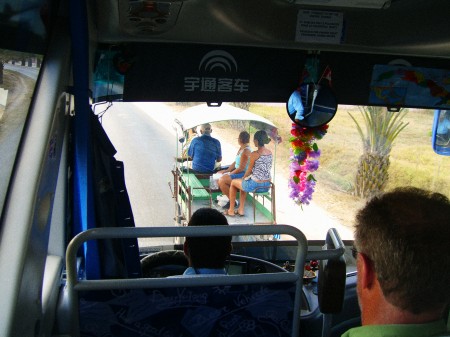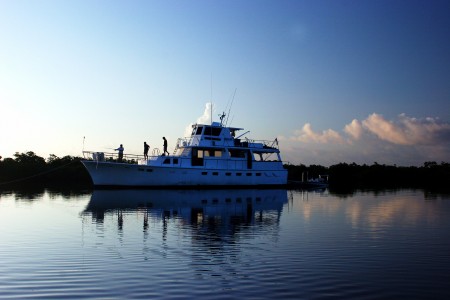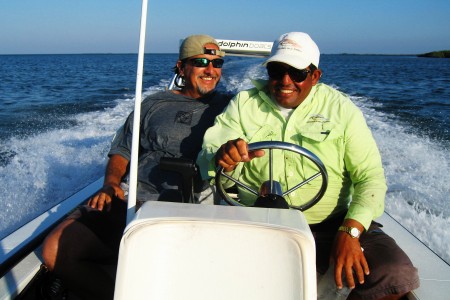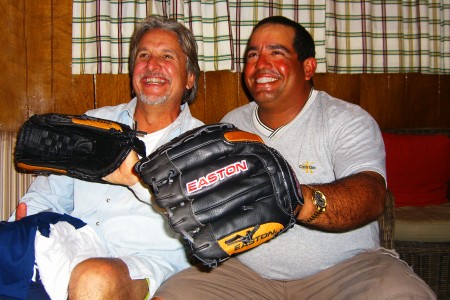It was very dark and very quiet when we got up at 4am to get on the private bus that took us to Júcaro, a little fishing village some 300 miles southeast of Havana. Short night for all of us, particularly Pedro, a photographer from Colorado, who’d just gotten in a few hours earlier. There was a small group of Canadians or Englishmen or something, going on one of the other boats, that we picked up at the Parque Central hotel. It looked like at least some of them had been up all night; one of the more drunk members decided to plop down in the seat beside Hardy and pester him with nonsense while Hardy did his best to convince him to move to one of the other open seats, to no avail. I was just hoping the guy didn’t throw up on Hardy. Or in the bus aisle.
Some people can sleep anywhere. I’m not one of them. I closed my eyes and pushed back my chair but there was no going back to sleep for me. I couldn’t block out the noise of the bus drivers talking to each other and I kept opening my eyes to look at the fires in the sugar cane fields, a rather surreal sight, or the sun slowly coming up over the dense tropical hills we were traveling through.
For five hours we rolled through central Cuba, sometimes slowing to a crawl as we fell behind a horse-drawn cart or maybe an old truck rumbling along at 20 miles per hour, its flatbed carrying the carcass of a single pig, flanked by eight or ten men, women, and children catching a ride to the next town or maybe to Ciego de Ávila, the only city of any consequence along the autopista which runs through the center of Cuba.
And then finally, after hours on the bus, you slip through Júcaro, all two or three blocks of it, and they open the port’s cyclone fence, locked so Cubans won’t steal one of the ratty boats from the fishing fleet and head for Miami, and the crew of the Halcón comes down to meet us and get all our luggage on board.
This is our third trip and there are lots of familiar faces—Elvis, the dive master, and Peachy, our cook, as well as some of the guides like Jimmi and Keko. It’s very disappointing to learn that Keko, who has been with us the last two years, is not on our boat this year. He has patiently taught me much about fly-fishing in the Jardines, a 125-mile-long archipelago composed of maybe a thousand uninhabited cayos (keys) lined with untouched beaches and white-sand flats, all protected by the third longest barrier reef in the world. Keko understands the Zen of the archipelago. So much so that last year I started calling him the Cuban Buddha.
At the end of the trip last year, Fletcher asked Keko what we could bring him this year. He wanted baseball equipment. For his two boys. So Fletch has hauled a 100-pounds of baseball gear over to Cuba to hand out to Keko and the other guides—three dozen balls, nine gloves, bats, helmets, and enough Yankee and Angel caps for two teams. Extraordinary.
But because Keko is not on the Halcón we have to make arrangements for him to come over and meet us before dinner after we’ve anchored in the little cove, 50 miles off the coast, where the mother ship for this operation, the Tortuga, a small floating hotel, is kept.
It’s hard to know what goes through Keko’s head when Fletch gives him the baseball gear for his boys. Keko is appreciative but not overly demonstrative. He smiles and thanks Fletch, takes his new gloves and bats and heads back for Tortuga. It must be hard to have to ask for such simple things as a bat and glove for your children. To know that even if you could pay for it (and Keko makes a good living by Cuban standards), there is no place to buy such things. Bats are handmade, as are most of the baseballs, and very few kids have gloves. Two teams might share a glove or two.
But I would like to be in Keko’s home when he gives the equipment to his two young boys. I would like to go outside with them when they first put on their new gloves and toss the shiny white hardball back and forth. I have a feeling that Keko will show more happiness with his boys than he was able to display in front of us. Such is the nature of gift-giving.
Tags: Cuba, Jardines de la Reina
Comments are now closed.





2 comments